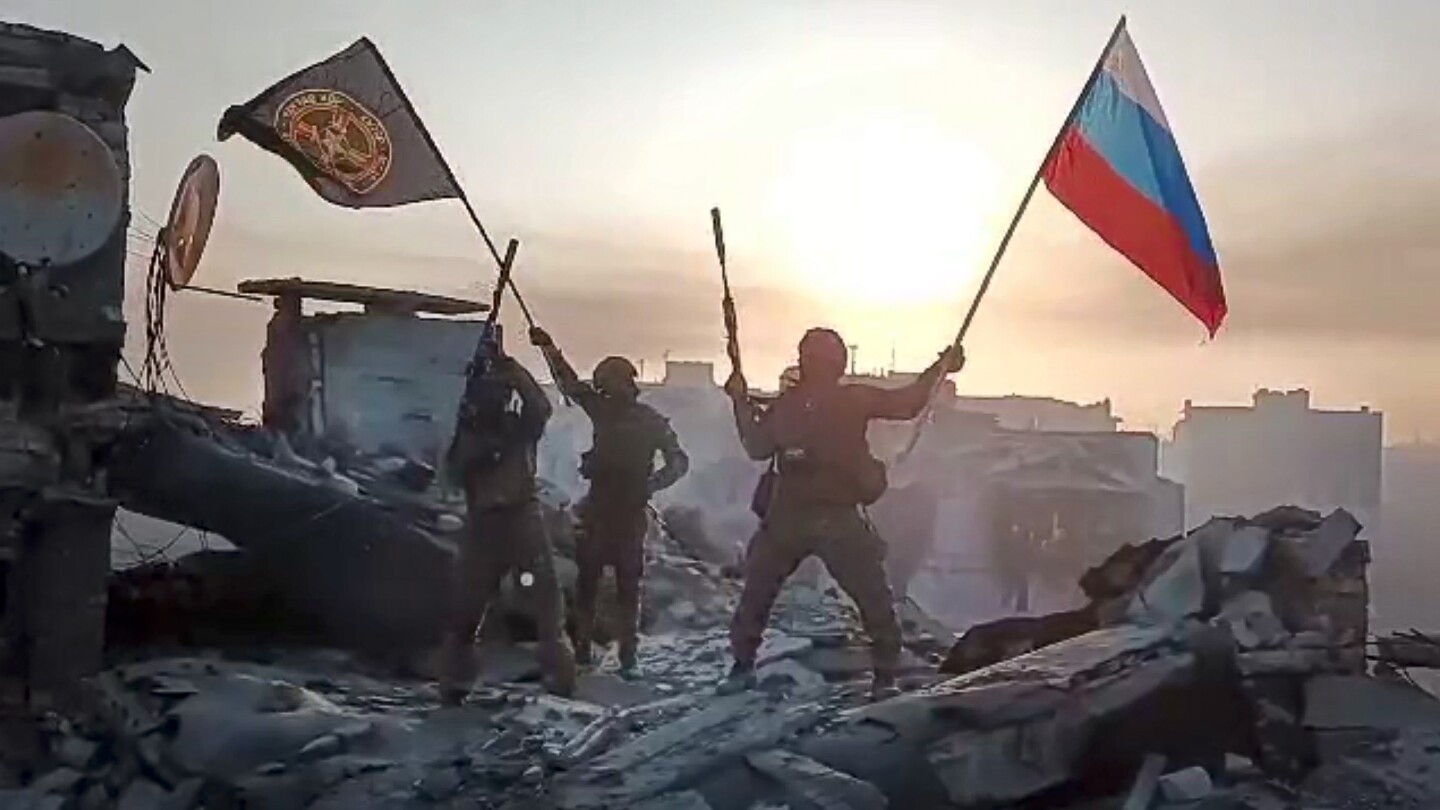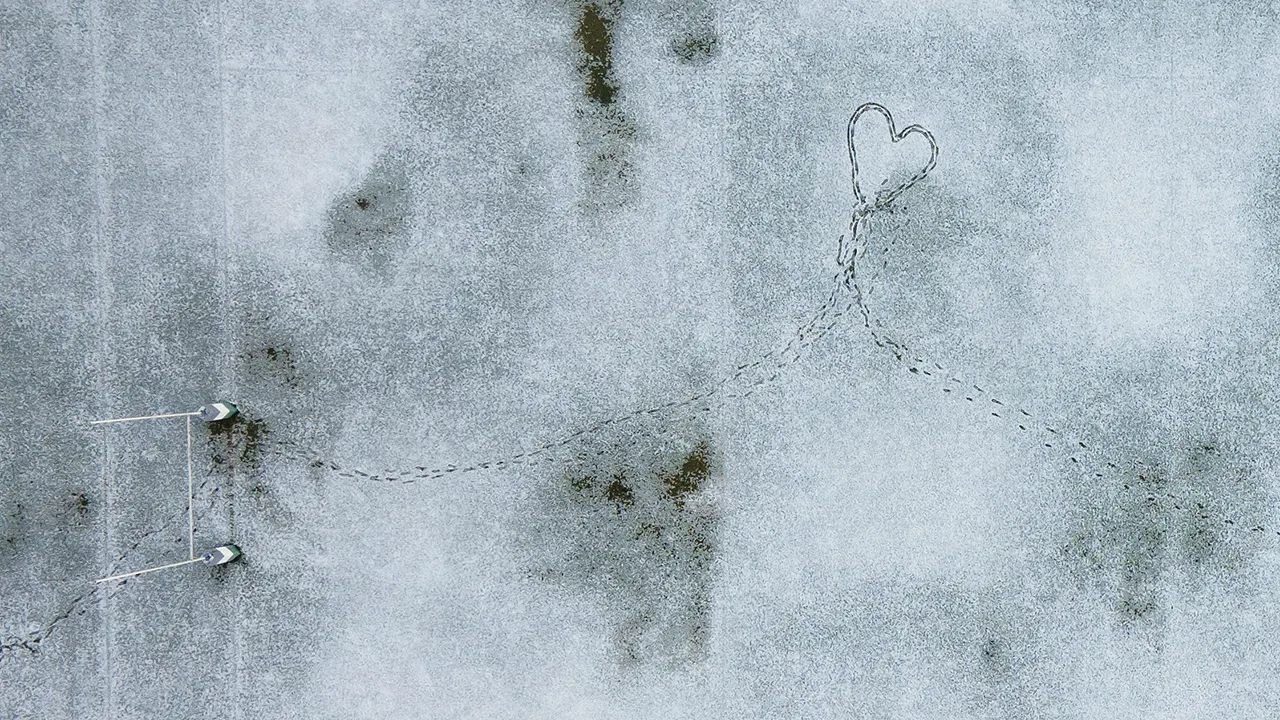World
An ex-convict returned from war and a Russian village lived in fear. Then police say he killed again

TALLINN, Estonia (AP) — When Ivan Rossomakhin returned home from the war in Ukraine three months ago, his neighbors in the village east of Moscow were terrified.
Three years ago, he was convicted of murder and sentenced to a long prison term but was freed after volunteering to fight with the Wagner private military contractor.
Back in Novy Burets, Rossomakhin drunkenly wandered the streets of the hamlet 800 kilometers (about 500 miles) east of Moscow, carrying a pitchfork and threatening to kill everyone, residents said.
One-by-one, victims stood in a Colorado courtroom to confront the person who pleaded guilty to murdering five people and injuring 17 others in a shooting last year at a sanctuary for the LGBTQ+ community.
People who have been disqualified from voting in Virginia because of their criminal records have filed a lawsuit against Gov.
Mexico says it has arrested the former head of a federal anti-kidnapping unit in connection with the disappearance of 43 students in 2014.
Prosecutors in Ohio have announced murder charges against a woman in the death of her 16-month-old daughter.
Despite police promises to keep an eye on the 28-year-old former inmate, he was arrested in a nearby town on charges of stabbing to death an elderly woman from whom he once rented a room. He reportedly confessed to committing the crime, less than 10 days after his return.
Rossomakhin’s case is not isolated. The Associated Press found at least seven other instances in recent months in which Wagner-recruited convicts were identified as being involved in violent crimes, either by Russian media reports or in interviews with relatives of victims in locations from Kaliningrad in the west to Siberia in the east.
Russia has gone to extraordinary lengths to replenish its troops in Ukraine, including deploying Wagner’s mercenaries there. That has had far-reaching consequences, as was evident this weekend when the group’s leader sent his private army to march on Moscow in a short-lived rebellion. Another has been the use of convicts in battle.
The British Defense Ministry warned of the fallout in March, saying “the sudden influx of often violent offenders with recent and often traumatic combat experience will likely present a significant challenge for Russia’s wartime society” as their service ends.
Wagner leader Yevgeny Prigozhin said he had recruited 50,000 convicts for Ukraine, an estimate also made by Olga Romanova, director of the prisoner rights group Russia Behind Bars. Western military officials say convicts formed the bulk of Wagner’s force there.
About 32,000 have returned from Ukraine, Prigozhin said last week, before his abortive rebellion against the Defense Ministry. Romanova estimated it to be about 15,000 as of early June.
Those prisoners agreeing to join Wagner were promised freedom after their service, and President Vladimir Putin recently confirmed that he was “signing pardon decrees” for convicts fighting in Ukraine. Those decrees have not been made public.
Putin recently said recidivism rates among those freed from prison through serving in Ukraine are much lower than those on average in Russia. But rights advocates say fears about those rates rising as more convicts return from war are not necessarily unfounded.
“People form a complete absence of a link between crime and punishment, an act and its consequences,” Romanova said. “And not just convicts see it. Free people see it, too -– that you can do something terrible, sign up for the war and come out as a hero.”
Rossomakhin wasn’t seen as valorous when he returned from fighting in Ukraine but rather as an “extremely restless, problematic person,” police said at a meeting with fearful Novy Burets residents that was filmed by a local broadcaster before 85-year-old Yulia Buyskikh was slain. At one point, he even was arrested for breaking into a car and held for five days before police released him March 27.
Two days later, Buyskikh was killed.
“She knew him and opened the door, when he came to kill her,” her granddaughter, Anna Pekareva, wrote on Facebook. “Every family in Russia must be afraid of such visitors.”
Other incidents included the robbery of a shop in which a man held a saleswoman at knifepoint; a car theft by three former convicts in which the owner of the vehicle was beaten and forced to sign it over to them; the sexual assault of two schoolgirls; and two other killings besides the one in Novy Burets.
In Kaliningrad, a man was arrested in the sexual assault of an 8-year-old girl after taking her from her mother, according to a local media report and one of the girl’s relatives.
The man had approached the mother and bragged about his prison time and his Wagner service in Ukraine, according to the relative, who spoke to AP on condition of anonymity out of safety concerns. The relative asked: “How many more of them will return soon?”
In its recruiting, Wagner usually offered convicts six-month contracts, according to media reports and rights groups. Then they can return home, unlike regular soldiers, who can’t terminate their contracts and leave service as long as Putin’s mobilization decree remains in effect. It wasn’t immediately clear, however, whether these terms will be honored after Prigozhin’s unsuccessful mutiny.
Prigozhin, himself a former convict, recently acknowledged that some repeat offenders were Wagner fighters -– including Rossomakhin in Novy Burets and a man arrested in Novosibirsk for sexually assaulting two girls.
Putin recently said the recidivism rate “is 10 times lower” among the convicts that went to Ukraine than for those in general. ”The negative consequences are minimal,” he added.
There isn’t enough data yet to assess the consequences, according to a Russian criminology expert who spoke on condition of anonymity out of safety concerns.
Incidents this year “fit the pattern of recidivist behavior,” and there’s a chance that those convicts would have committed crimes again upon release, even if they hadn’t been recruited by Wagner, the expert said. But there’s no reason to expect an explosive spike in crime because a significant number of the ex-convicts probably can refrain from breaking the law for some time, especially if they were well-paid by Wagner, the expert said.
He expects crime rates to rise after the war, but not necessarily due to the use of convicts. It’s something that usually happens following conflicts, he said.
The Soviet Union sent 1.2 million convicts to fight in World War II, according to a 2020 research paper by Russia’s state penitentiary service. It did not say how many returned, but the criminology expert told AP a “significant number” ended up behind bars again after committing new crimes for years afterward.
Romanova from Russia Behind Bars says there have been many troubling episodes involving convicts returning to civilian life after a stint in Ukraine.
Law enforcement and justice officials who spent time and resources to prosecute these criminals can feel humiliated by seeing many of them walk free without serving their sentences, she said.
“They see that their work is not needed,” Romanova added.
Some convicts who are caught committing crimes after returning home sometimes try to turn the tables on police by accusing them of discrediting those who fought in Ukraine — now a serious crime in Russia, she said.
Asked if that deters those in law enforcement, Romanova said: “You bet. A prosecutor doesn’t want to go to prison for 15 years.”
Yana Gelmel, lawyer and rights advocate who also works with convicts, said in an interview that those returning from Ukraine often act with bravado and bluster, demanding special treatment for having “defended the motherland.”
She paints a grim life in Russia’s prisons, with rampant and incessant violence, extreme isolation, constant submission to guards and a strict hierarchy among inmates. For prisoners in those conditions, “what would his mental state be?” Gelmel asked.
Add in the trauma of being thrown into battle — especially in places like Bakhmut in eastern Ukraine, the longest and bloodiest of the conflict, where Wagner forces died by the thousands,
“Imagine -– he went to war. If he survived … he witnessed so much there. In what state will he return?” she added.
Meanwhile, prison recruiting for duty in Ukraine apparently continues — just not by Wagner, rights groups say. The Defense Ministry is now seeking volunteers there instead and offering them contracts.
Romanova said the ministry had recruited nearly 15,000 convicts as of June, although officials there did not respond to a request for comment.
Unlike Wagner, the Defense Ministry soon will have legal grounds -– laws allowing for enlisting convicts into contractual service have been swiftly approved by the parliament and signed by Putin last week.
And unlike Wagner, the ministry is offering 18-month contracts, but many recruits haven’t been given anything to sign, ending up in a precarious position, Romanova said.
Enthusiasm among inmates to serve hasn’t waned, she said, even after thousands were killed on the battlefield.
“Russian roulette is our favorite game,” Romanova said, grimly. “National entertainment.”
___
Follow AP coverage of the Ukraine war at https://apnews.com/hub/russia-ukraine-war

World
Ukraine's divisive mobilization law comes into force as a new Russian push strains front-line troops
KYIV, Ukraine (AP) — A divisive mobilization law in Ukraine came into force on Saturday, as Kyiv struggles to boost troop numbers after Russia launched a new offensive that some fear could close in on Ukraine’s second-largest city.
The legislation, which was watered down from its original draft, will make it easier to identify every conscript in the country. It also provides incentives to soldiers, such as cash bonuses or money toward buying a house or car, that some analysts say Ukraine cannot afford.
Lawmakers dragged their feet for months and only passed the law in mid-April, a week after Ukraine lowered the age for men who can be drafted from 27 to 25. The measures reflect the growing strain that more than two years of war with Russia has had on Ukraine’s forces, who are trying to hold the front lines in fighting that has sapped the country’s ranks and stores of weapons and ammunition.
Ukrainian President Volodymyr Zelenskyy also signed two other laws Friday, allowing prisoners to join the army and increasing fines for draft dodgers fivefold. Russia enlisted its prisoners early on in the war, and personnel shortages compelled Ukraine to adopt the new measures.
Russian troops, meanwhile, are pushing ahead with a ground offensive that opened a new front in northeastern Ukraine’s Kharkiv region and put further pressure on Kyiv’s overstretched military. After weeks of probing, Moscow launched the new push knowing that Ukraine suffered personnel shortages, and that its forces have been spread thin in the northeast.
Russian President Vladimir Putin said on Friday during a visit to China that the Russian push aims to create “a buffer zone” rather than capturing Kharkiv, the local capital and Ukraine’s second-largest city.
Still, Moscow’s forces have pummeled Kharkiv with strikes in recent weeks, hitting civilian and energy infrastructure and prompting angry accusations from Zelenskyy that the Russian leadership sought to reduce the city to rubble. On Friday, Mayor Ihor Terekhov said that Russian guided bombs killed at least three residents and injured 28 others that day.
Moscow denies deliberately targeting civilians, but thousands have died or suffered injuries in the more than 27 months of fighting.
The U.S. last week announced a new $400 million package of military aid for Ukraine, and President Joe Biden has promised that he would rush badly needed weaponry to the country to help it stave off Russian advances. Still, only small batches of U.S. military aid have started to trickle into the front line, according to Ukrainian military commanders, who said it will take at least two months before supplies meet Kyiv’s needs to hold the line.
Thousands of Ukrainians have fled the country to avoid the draft since Russia’s all-out invasion in February 2022, some risking their lives as they tried to swim across a river separating Ukraine from neighboring Romania and Hungary.
Late on Friday, Ukraine’s border service said that at least 30 people have died trying to cross the Tisza River since the full scale-invasion.
Romanian border guards days earlier retrieved the near-naked, disfigured body of a man that appeared to have been floating in the Tisza for days, and is the 30th known casualty, the Ukrainian agency said in an online statement. It said the man has not yet been identified.
___
Follow AP’s coverage at https://apnews.com/hub/russia-ukraine
World
An unusual autumn freeze grips parts of South America, giving Chile its coldest May in 74 years

Chileans are bundling up for their coldest autumn in more than 70 years mere days after sunning in T-shirts — a dramatic change of wardrobe brought on this week by a sudden cold front gripping portions of South America unaccustomed to bitter wind chills this time of year.
CHILE SHUTS DOWN A POPULAR GLACIER, SPARKING DEBATE OVER CLIMATE CHANGE AND ADVENTURE SPORTS
Temperatures broke records along the coast of Chile and in Santiago, the capital, dipping near freezing and making this month the coldest May that the country has seen since 1950, the Chilean meteorological agency reported.
An unusual succession of polar air masses has moved over southern swaths of the continent, meteorological experts say, pushing the mercury below zero Celsius (32 Fahrenheit) in some places. It’s the latest example of extreme weather in the region — a heat wave now baking Mexico, for instance — which scientists link to climate change.
Footprints create the shape of a heart in a snow-covered rugby field in Santiago, Chile, Wednesday, May 8, 2024. (AP Photo/Matias Basualdo)
“The past few days have been one of the longest (cold fronts) ever recorded and one of the earliest ever recorded” before the onset of winter in the Southern Hemisphere, said Raul Cordero, a climatologist at Santiago University. “Typically the incursions of cold air from the Antarctic that drive temperatures below zero occur from June onwards, not so much in May.”
The cold front sweeping in from Antartica has collided with warm air pushing in from the northwestern Amazon, helping fuel heavy rainstorms battering Brazil, according to that country’s National Meteorological system.
Chile’s government issued frosty weather alerts for most of the country and ramped up assistance for homeless people struggling to endure the frigid temperatures on the streets. Snow cloaked the peaks of the Andes and fell in parts of Santiago, leading to power outages in many areas this week.
“Winter came early,” said Mercedes Aguayo, a street vendor hawking gloves and hats in Santiago.
She said she was glad for a boost in business after Chile’s record winter heat wave last year, which experts pinned on climate change as well as the cyclical El Niño weather pattern.
“We had stored these goods (hats and gloves) for four years because winters were always more sporadic, one day hot, one day cold,” Aguayo said.
This week’s cold snap also took parts of Argentina and Paraguay by surprise.
Energy demand soared across many parts of Argentina. Distributors cut supplies to dozens of gas stations and industries in several provinces to avoid outages in households, , the country’s main hydrocarbon company, CECHA, said Thursday.
World
Brussels, my love? Transparency over MEPs' side jobs

In this edition, we look at what lawmakers’ extracurricular activities mean for their core role.
This week, we are joined by Sophia Russack, senior researcher from the Centre for European Policy Studies, Petros Fassoulas, secretary general of European Movement International and Anna Nalyvayko, senior project officer from the Wilfried Martens Center.
Panelists debate the ethical questions raised by MEPs who have side jobs. Those extra roles are legal, but the political earthquake caused by the Qatarargate scandal led to tighter rules and more transparency.
Is this enough to bridge the gulf between citizens and politicians, in today’s fractured political landscape?
“We see that they have improved rules when it comes to reporting requirements, to laying open your financial situation before and after the offers, and so on. But to be honest, none of these things will prevent another Qatargate,” said Sophia Russack, a think tanker who is an expert in EU institutional architecture, decision-making processes and institutional reform.
Despite these concerns, Petros Fassoulas said MEPs shouldn’t abandon contact with the real world altogether.
“It’s important for them to have the opportunity to bring expertise from outside and engage also with the world outside of the chamber,” Fassoulas said. “An MEP or any parliamentarian should be in contact with the people that they regulate, the businesses that they have an impact on.”
Guests also discussed the reasons for the crisis of public confidence in politicians, and gave some ideas for solutions.
Watch “Brussels, my love?” in the player above.
-

 World1 week ago
World1 week agoPentagon chief confirms US pause on weapons shipment to Israel
-

 Politics1 week ago
Politics1 week agoRFK Jr said a worm ate part of his brain and died in his head
-

 Politics1 week ago
Politics1 week agoOhio AG defends letter warning 'woke' masked anti-Israel protesters they face prison time: 'We have a society'
-

 Education1 week ago
Education1 week agoVideo: Police Use Pepper Spray on Protesters on G.W.U.’s Campus
-

 News1 week ago
News1 week agoNine Things We Learned From TikTok’s Lawsuit Against The US Government
-

 Politics1 week ago
Politics1 week agoBiden’s decision to pull Israel weapons shipment kept quiet until after Holocaust remembrance address: report
-

 World1 week ago
World1 week agoA look at Chinese investment within Hungary
-

 News1 week ago
News1 week agoThe Major Supreme Court Cases of 2024

















